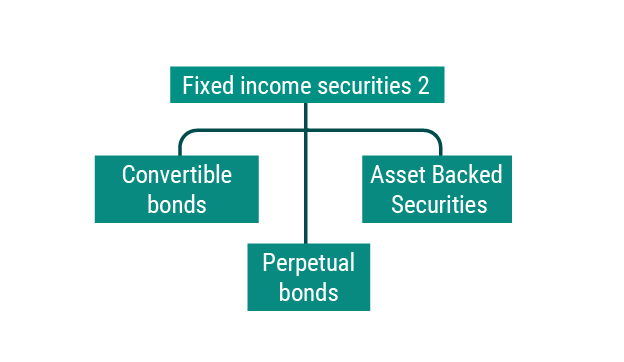Fixed income securities mainly refer to bonds that provide a fixed interest rate. By category 2 fixed income securities we mean special bonds. These are bonds with special features and conditions. These bonds therefore have different risks than regular bonds.
This concerns 3 types of special bonds:

Just as with a regular bond, a company can issue a convertible bond to raise money for new investments, for example. But with a convertible bond, you as bondholder have the right to convert the bond into a predetermined number of shares of that company at a predetermined price (the conversion price), within a predetermined period (the exercise period). This right is similar to the right of a call option. Because of this right, the coupon interest of a convertible bond is usually lower than the coupon interest of a comparable regular bond.
Bond value and conversion value
A convertible bond has two types of values:
We also call a perpetual bond a revolving bond. It is a bond with no maturity date. As a result, you do not know when you will get your money back. The issuer usually has the option to repay the perpetual bond early at predetermined times. But whether it actually does, depends on the conditions that it agreed upon when the perpetual bond was issued and on the development on the stock market. The issuer can also decide to skip the interest in a given year; we call this passing. Perpetual bonds offer you a higher coupon interest than comparable regular bonds, but this is in exchange for the uncertainty whether you will receive all the interest and when you will get your money back. The price of a perpetual bond also responds more strongly to a change in interest rate than a regular bond.
Asset Backed Securities are bonds in which the coupon interest and the repayment of the bond are based on collateral of packages of different types of loans. This concerns, for example, packages of mortgages and car financing. We also refer to Asset Backed Securities as repackaged loans. The issuers may issue the underlying packages in different tranches (parts). Each tranche has its own credit risk.
Investing in Asset Backed Securities is risky. This is because it is often unclear what exactly the collateral consists of. It is also difficult to estimate the risk of large groups of people being unable to repay their mortgages or loans. This makes the credit risk of Asset Backed Securities much more unclear than the credit risk of a regular bond, where the credit risk consists only of the risk that the issuer cannot repay the bond.
Asset Backed securities were one of the main causes of the US credit crisis in 2007, the collateral consisted mainly of mortgage packages with a variable rate. When mortgage rates soared, many US citizens were unable to repay that higher interest rate on their mortgage or even the entire mortgage. As a result, the Asset Backed Securities very quickly lost all of their value or had very little value left.
At ABN AMRO, you can trade fixed income securities with the investment method Self Directed Investing Plus. Category 2 fixed income securities are complex investment products with greater financial risks than shares. Before you can trade in category 2 fixed income securities at ABN AMRO, we first ask you to take a knowledge and experience test on this. If you pass the test, you have sufficient knowledge to be able to invest in fixed income securities. To the knowledge and experience test on category 2 fixed income securities.
With our professional and reliable platform My Dealingroom, you can place orders 24/7 to buy or sell investments. You can choose from a wide range of investment products.
For the active investor: